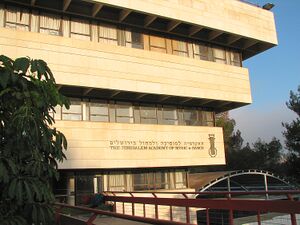Difference between revisions of "Rubin Academy of Music"
(Added: website, other_names.) |
m (Text replacement - "who served as" to "who was") |
||
| (One intermediate revision by one other user not shown) | |||
| Line 1: | Line 1: | ||
{{group | {{group | ||
|wikipedia=https://en.wikipedia.org/wiki/Jerusalem_Academy_of_Music_and_Dance | |wikipedia=https://en.wikipedia.org/wiki/Jerusalem_Academy_of_Music_and_Dance | ||
| − | |start= | + | |image=Jerusalem Academy of Music and Dance 1.jpg |
| − | |headquarters= | + | |start=1933 |
| + | |headquarters=Jerusalem, Israel | ||
|website=http://www.jamd.ac.il/en/ | |website=http://www.jamd.ac.il/en/ | ||
|other_names=JAMD | |other_names=JAMD | ||
| + | |description=Israeli music academy | ||
}} | }} | ||
| + | '''The Jerusalem Academy of Music and Dance''', is a school for the music and the performing arts in [[Jerusalem]]. It is located on the [[Hebrew University#Givat Ram (Edmond Safra)|Givat Ram]] campus of the [[Hebrew University of Jerusalem]]. | ||
| + | |||
| + | ==History== | ||
| + | The Jerusalem Conservatory of Music in Jerusalem was founded in August 1933 by violinist Emil Hauser, who was its first director. His wife, [[Helena Kagan]], a pioneer of pediatric medicine in pre-state Israel, was honorary secretary in 1938–1946.<ref>https://web.archive.org/web/20160801161644/http://jwa.org/encyclopedia/article/kagan-helena </ref> The principal of the school was Yocheved Dostorevsky, a pianist who [[aliyah|immigrated]] to Jerusalem from Vienna. Israeli composer [[Josef Tal]] headed the academy in 1948–52.<ref>https://web.archive.org/web/20110928023842/http://www.imi.org.il/Composer.aspx?id=600f2e7f-ba9e-44da-82f7-d14635bb41e6 </ref> Classes were held at a building on the corner of [[Kikar Zion]] in the center of Jerusalem.<ref>https://web.archive.org/web/20160304110502/http://www.nrg.co.il/online/54/ART1/942/294.html </ref> As the number of students rose, the school moved to rented premises, the Schmidt building, on [[Hillel Street]]. | ||
| + | |||
| + | In 1958, Samuel Rubin, president of the Norman Foundation (now the America-Israel Cultural Foundation), donated a large sum of money to purchase a building on [[Peretz Smolenskin|Smolenskin Street]] in Jerusalem's [[Rehavia]] neighborhood. The inauguration took place in the presence of [[Golda Meir]], [[Teddy Kollek]] and other dignitaries. At the ceremony, the school was renamed the Rubin Academy of Music in Jerusalem.<ref>https://web.archive.org/web/20110528001732/http://www.jamd.ac.il/en/content/history </ref> | ||
| + | |||
| + | That same year, the Academy library was established under the leadership of [[Claude Abravanel]]. During his 35 years as director, the library collected books, journals, scores, first editions and the like. The collection now resides in the Academy's library and in the Israeli music archives, founded in 1988.< | ||
| + | |||
| + | Edith Gerson-Kiwi, an ethnomusicologist specializing in the ethnic music of the oriental Jewish communities of Palestine and Israel, taught music history there in 1942. With the encouragement of Emil Hauser, she established the Phonograph Archives of the Palestine Institute of Folklore and Ethnology and the academy's collection of ethnic musical instruments.<ref>https://web.archive.org/web/20160802003217/http://jwa.org/encyclopedia/article/gerson-kiwi-edith </ref> | ||
| + | |||
| + | In 1965, Hassia Levy-Agron, a pioneer of dance in Israel, established the school's dance department. | ||
| + | <ref>http://jwa.org/encyclopedia/article/levy-agron-hassia</ref> <ref>http://www.thejc.com/social/obituaries/obituary-mendi-rodan</ref> | ||
{{SMWDocs}} | {{SMWDocs}} | ||
==References== | ==References== | ||
{{reflist}} | {{reflist}} | ||
| − | |||
Latest revision as of 20:16, 20 February 2023
 | |
| Formation | 1933 |
| Headquarters | Jerusalem, Israel |
| Other name | JAMD |
| Israeli music academy | |
The Jerusalem Academy of Music and Dance, is a school for the music and the performing arts in Jerusalem. It is located on the Givat Ram campus of the Hebrew University of Jerusalem.
History
The Jerusalem Conservatory of Music in Jerusalem was founded in August 1933 by violinist Emil Hauser, who was its first director. His wife, Helena Kagan, a pioneer of pediatric medicine in pre-state Israel, was honorary secretary in 1938–1946.[1] The principal of the school was Yocheved Dostorevsky, a pianist who immigrated to Jerusalem from Vienna. Israeli composer Josef Tal headed the academy in 1948–52.[2] Classes were held at a building on the corner of Kikar Zion in the center of Jerusalem.[3] As the number of students rose, the school moved to rented premises, the Schmidt building, on Hillel Street.
In 1958, Samuel Rubin, president of the Norman Foundation (now the America-Israel Cultural Foundation), donated a large sum of money to purchase a building on Smolenskin Street in Jerusalem's Rehavia neighborhood. The inauguration took place in the presence of Golda Meir, Teddy Kollek and other dignitaries. At the ceremony, the school was renamed the Rubin Academy of Music in Jerusalem.[4]
That same year, the Academy library was established under the leadership of Claude Abravanel. During his 35 years as director, the library collected books, journals, scores, first editions and the like. The collection now resides in the Academy's library and in the Israeli music archives, founded in 1988.<
Edith Gerson-Kiwi, an ethnomusicologist specializing in the ethnic music of the oriental Jewish communities of Palestine and Israel, taught music history there in 1942. With the encouragement of Emil Hauser, she established the Phonograph Archives of the Palestine Institute of Folklore and Ethnology and the academy's collection of ethnic musical instruments.[5]
In 1965, Hassia Levy-Agron, a pioneer of dance in Israel, established the school's dance department. [6] [7]
An Alumnus on Wikispooks
| Person | Born | Nationality | Summary | Description |
|---|---|---|---|---|
| Gilad Atzmon | 9 June 1963 | Israel | Author Musician | Jazz saxophonist, novelist, political activist and writer - mainly on the subjects of Israel and Judaic power |
References
- ↑ https://web.archive.org/web/20160801161644/http://jwa.org/encyclopedia/article/kagan-helena
- ↑ https://web.archive.org/web/20110928023842/http://www.imi.org.il/Composer.aspx?id=600f2e7f-ba9e-44da-82f7-d14635bb41e6
- ↑ https://web.archive.org/web/20160304110502/http://www.nrg.co.il/online/54/ART1/942/294.html
- ↑ https://web.archive.org/web/20110528001732/http://www.jamd.ac.il/en/content/history
- ↑ https://web.archive.org/web/20160802003217/http://jwa.org/encyclopedia/article/gerson-kiwi-edith
- ↑ http://jwa.org/encyclopedia/article/levy-agron-hassia
- ↑ http://www.thejc.com/social/obituaries/obituary-mendi-rodan